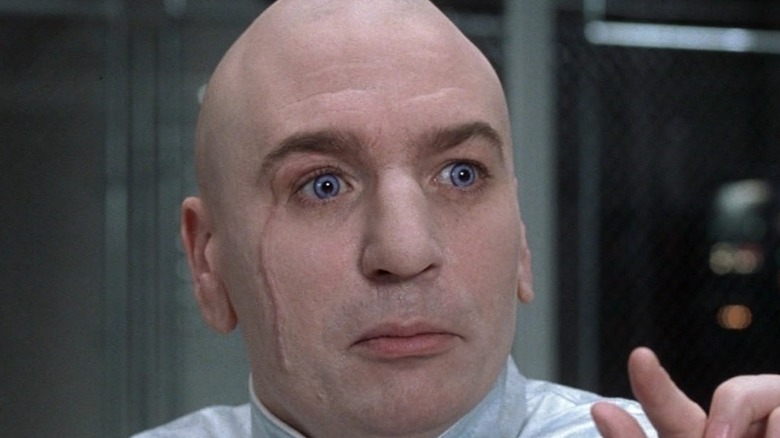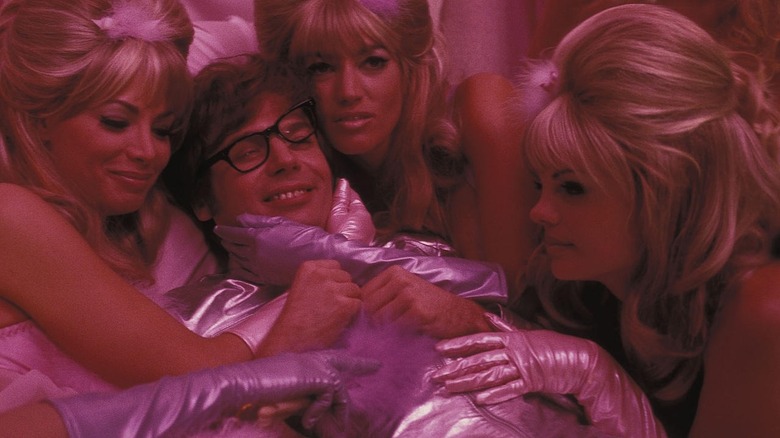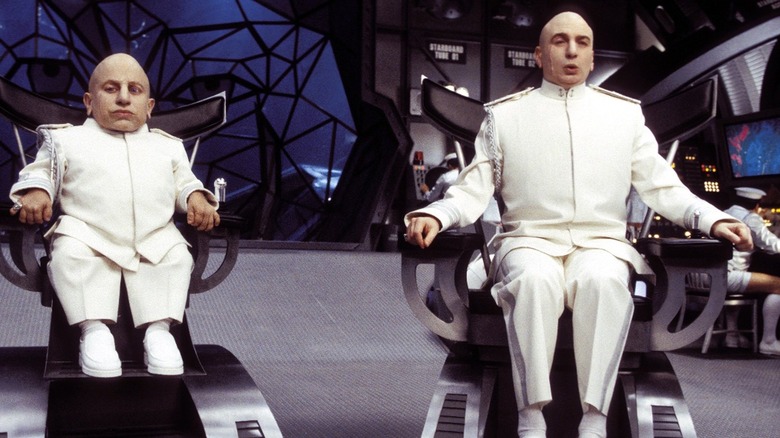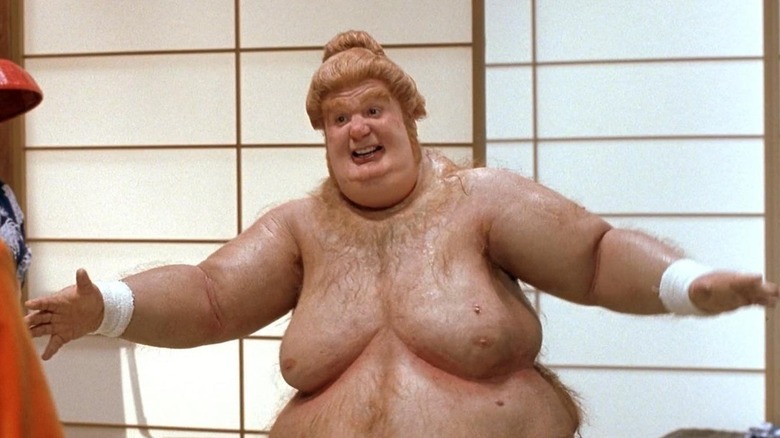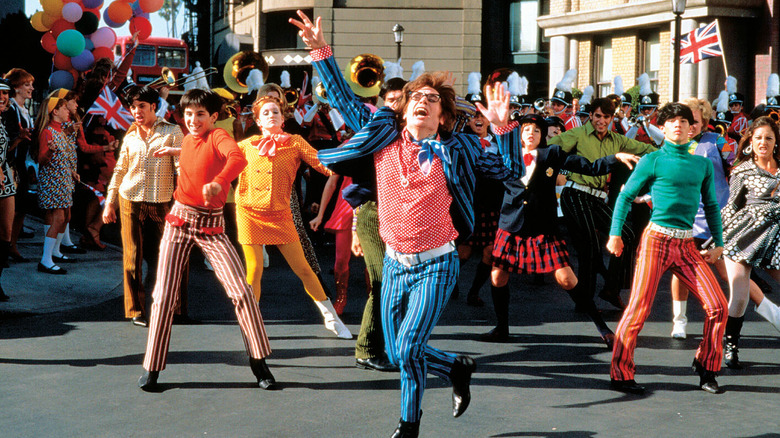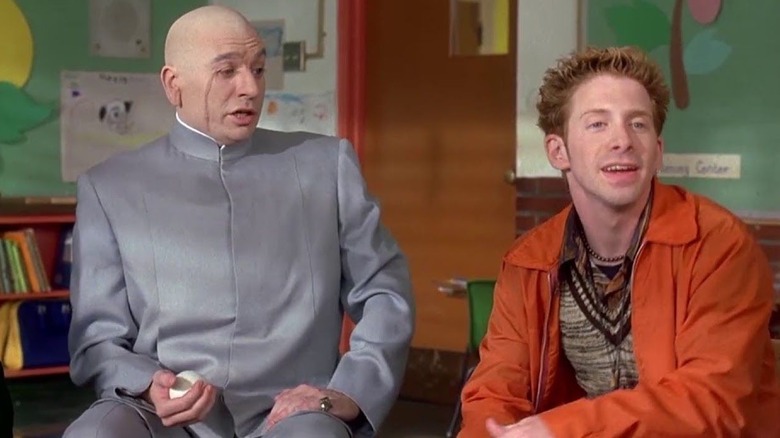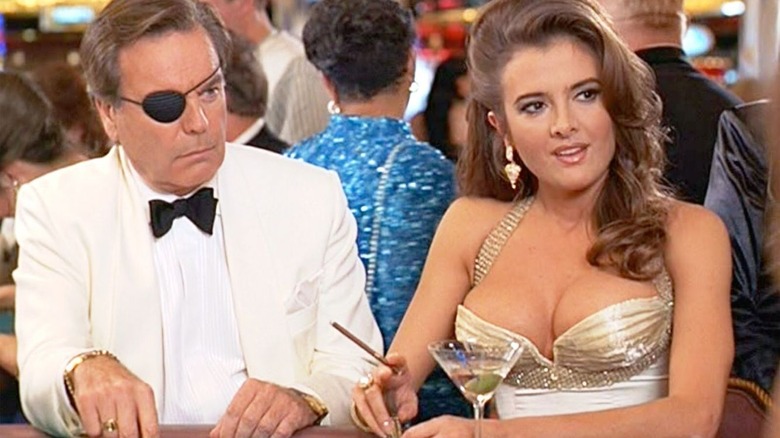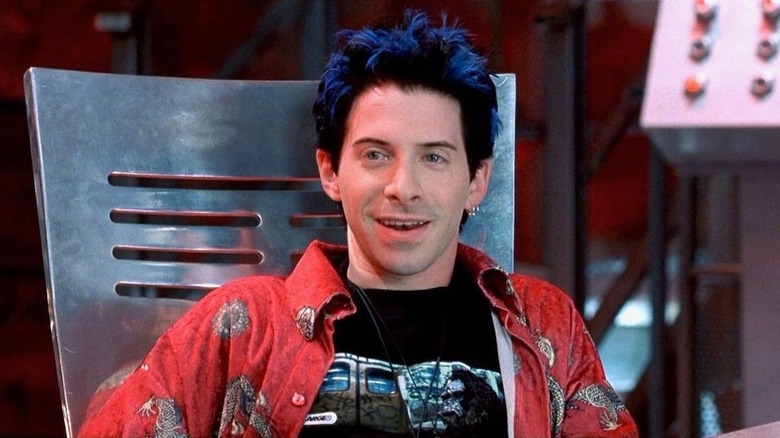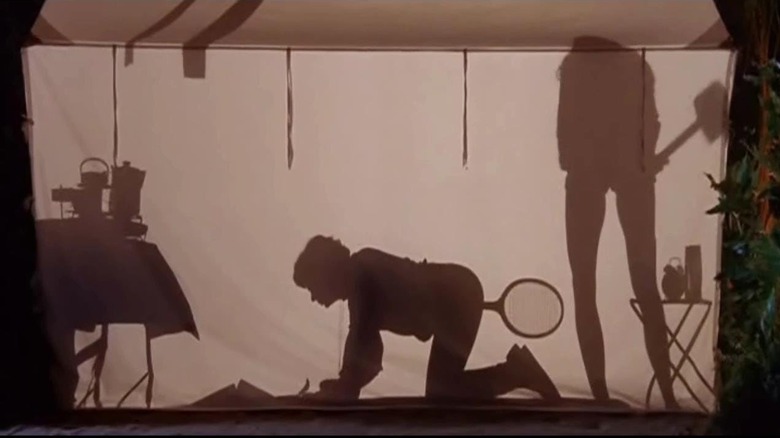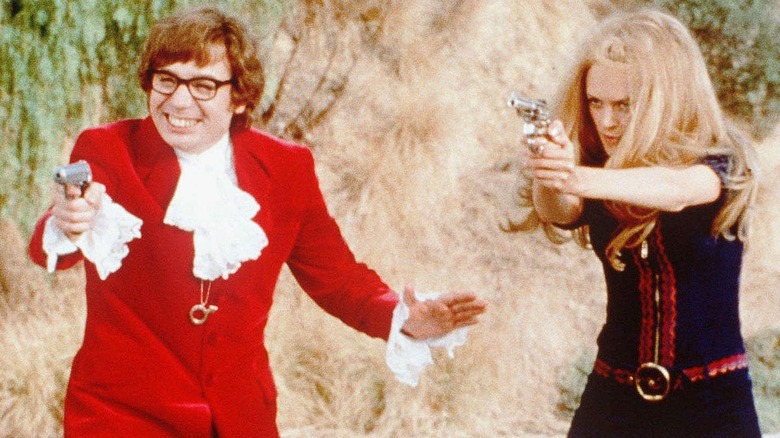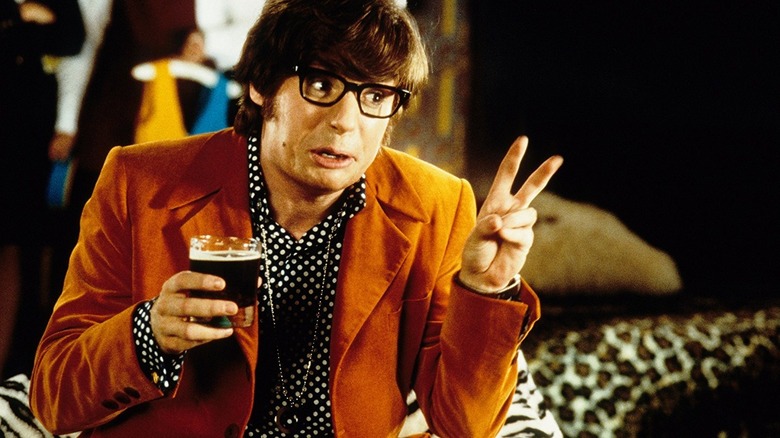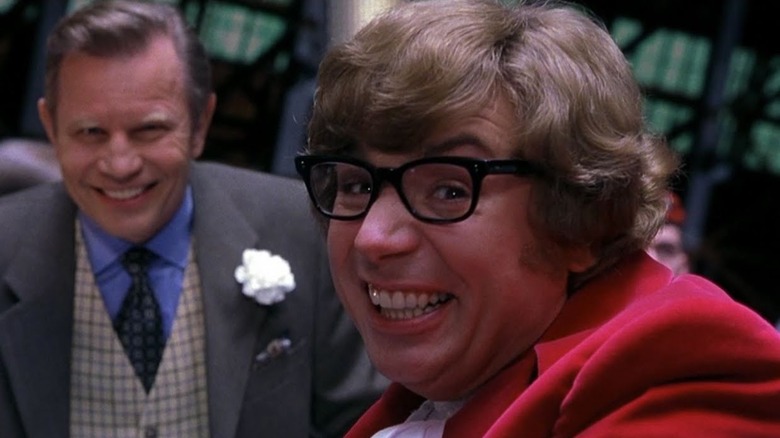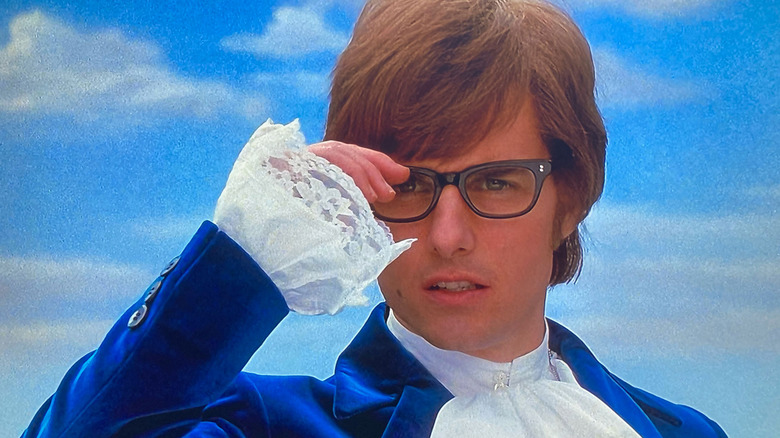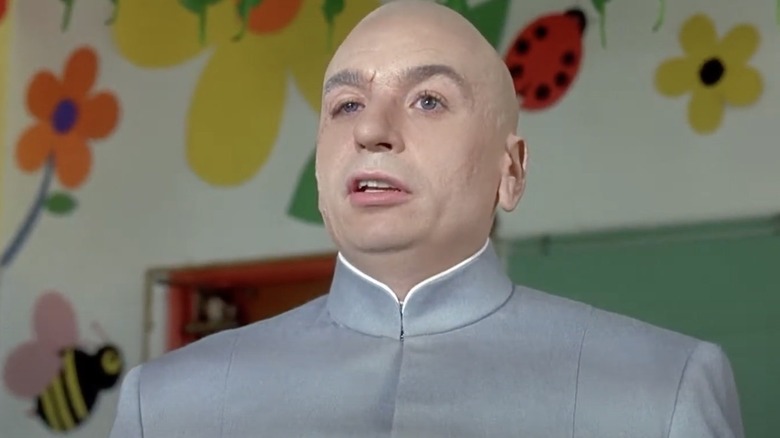Things That Happen In Every Austin Powers Movie
Modern parody films have fallen into disrepute in recent times, due to their tendency to have bad acting and poor storylines padded with cheap sexual jokes and gross bodily humor. But there was a time when parody movies were considered a legit genre full of talented actors and filmmakers. Some great examples of parody films that are actually good can be found in the "Austin Powers" series.
Kickstarted with "Austin Powers: International Man of Mystery" in 1997, the franchise was conceived as a parody of "James Bond" movies. Mike Myers stars as both the titular hero, secret agent Austin Powers, and the main villain Dr. Evil. The duo remain locked in a never-ending battle with the fate of the world at stake across the first "Austin Powers" movie, and its two sequels, "Austin Powers: The Spy Who Shagged Me" (1999) and "Austin Powers in Goldmember" (2002).
The series enjoyed immense popularity around the world, and its jokes at the expense of the "James Bond" franchise became such a staple of pop culture that Danie Craig admitted it was a major reason behind "James Bond" movies giving up their old, campy tone for a more gritty and realistic approach. Let us take a look at some of the story beats that appear in each "Austin Powers" movie.
Austin is irresistible to women
Austin Powers, played by Mike Myers, is the most famous parody of James Bond in pop culture. Both characters work as secret agents, foiling one preposterous plan to destroy the world after another, while also finding the time to bed every gorgeous woman who comes their way.
In appearance, Austin is the polar opposite of Bond, being a short, bespectacled dude with bad teeth and a hairy chest. Yet Austin's lack of polished and suave looks never seem to hamper his eternal pursuit of the opposite sex. As Myers explained to Vanity Fair, Austin Powers is a swinger right out of the '60s and '70s who relies more on his innate charm, nicknamed his "mojo," than his looks to attract women. And the strategy works spectacularly well.
In each movie Austin is surrounded by a crowd of beautiful and adoring women. Even the rare woman that manages to escape Austin's charm at first, like Vanessa Kensington (Elizabeth Hurley) in the first movie, eventually warm up to Austin's goofy but sweet-natured seduction technique. It must also be mentioned that while Austin and Bond have bedded an impressive number of women between them, Austin treats his romantic paramours with a great deal more respect and affection than Bond can generally manage.
A sinister plan for world domination
While Austin Powers is the face of his franchise, everyone knows the true breakout star of the series is Mike Myers as Dr. Evil, Austin's arch-nemesis. Modelled after traditional "James Bond" villains like Ernst Blofeld, Dr. Evil always has a plan handy for taking the world hostage in some fashion to extract vast sums of money from world governments.
In the first movie, Dr. Evil has a plan to drill a nuclear warhead into the core of the planet, which would destroy civilization through volcanic eruptions unless the United Nations agree to give Dr. Evil a giant sum of money. Then came the second movie, where apart from taking down Austin Powers by stealing his "mojo," Dr. Evil also intended to hold the world ransom using a city-destroying laser located on the moon.
Both times Austin Powers and his allies managed to foil Dr. Evil's plans, but the dude is nothing if not persistent. Dr. Evil was up to his old tricks once again in the third movie. This time, he teamed up with the nefarious disco-obsessed terrorist named Goldmember to develop a tractor beam that would pull a giant meteor into Earth's orbit — unless the world submitted to their demands.
Visiting Dr. Evil in his lair
In the old days, no self-respecting supervillain would be caught working out of their bedroom or some office. Instead, supervillains delighted in owning distant, giant secret lairs — ones that really shouldn't be able to be kept secret, considering how elaborately modelled the lairs are to reflect the narcissism of their owner.
In the case of the "Austin Powers" films, each movie shows us various huge structures where Dr. Evil hides out with his crew and carries out his dastardly plans. The first movie had the headquarters of Virtucon, a legitimate and highly-lucrative business that Dr. Evil insisted on using to build a secret nuclear warhead with which to hold the world hostage. In the second movie, Dr. Evil upgraded to a secret volcano lair. From their it was only a hop, skip, and a jump over to a secret moon base, which Dr. Evil had developed to house his giant laser. Finally, in the third movie, Dr. Evil takes up residence in a new secret lair in Tokyo before moving on to a giant underwater submarine built in his image.
Dr. Evil's flair for the dramatic when it comes to picking his base of operations is another area where the "Austin Powers" movies have the "James Bond" franchise beat.
Weird hench people
While Austin Powers is as prone to rolling between the sheets with supermodels as James Bond, the former spy is also not above engaging in fisticuffs if the occasion demands it. And that happens quite frequently because of Dr. Evil's habit of hiring sinister but quixotic hench people to help him carry out his evil plans across the world.
Probably the most notable henchperson in the franchise is Fat Bastard, a giant Scottish assassin also played by Mike Myers. Then there is Mini-Me (Verne Troyer), Dr. Evil's minimalistic clone who does not speak but still ably conveys his contempt for his enemies, especially Dr. Evil's biological son Scott (Seth Green).
There was also Mustafa (Will Ferrell), the surprisingly resilient henchman who could not stand to be asked the same question three times, and Irish assassin Patty O'Brien (Paul Dillon), who made a habit of putting a charm from his bracelet on the bodies of his victims to mark his work. And let's not forget Goldmember, the perverted terrorist who, as his name suggests, liked to paint the genitals of his victims gold and was particularly hated by Dr. Evil for being Dutch.
A rousing musical number
The world of "Austin Powers" parodies many aspects of the "James Bond" franchise. This includes the songs seen in many "James Bond" movies during the opening credits. Those songs are engineered to sound grand and sweeping and sophisticated, befitting Bond's character. So naturally the "Austin Powers" series goes in the completely opposite direction.
The very first movie opens in London, where Austin can be seen skipping down the street and dancing to music that only he seems to hear. It is not long before Austin's groovy moves infect the crowd milling around him, and soon the entire scene turns into an exuberant dance number with flashy clothes and silly dance moves. That opening lets you know right away how far removed Austin's world is from Bond's stylish seriousness.
The second movie has several musical interludes, but the best one is a surprisingly touching rendition of "Just the Two of Us" sung by Dr. Evil in honor of his relationship with Scott and Mini-Me. Finally, in the third movie, we once again open with a big musical number centering on Austin, a cabaret performance by Foxxy Cleopatra (Beyonce). Later in the movie, Dr. Evil and Mini-Me come together in prison to sing "It's a Hard Knock Life" with the other inmates.
Evil family problems
Despite being the most over-the-top evil scientist you can imagine in an action franchise, Dr. Evil is one of the most sympathetic characters in the "Austin Powers" movies. This is because of the attention given to his private life and the mess of interpersonal relationships that make Dr. Evil's life so difficult.
The first movie had the evil doctor discover that he has a secret son named Scott Evil. The relationship between the two is fraught to say the least, even though Dr. Evil tries many times to form a personal bond with Scott. In the second movie, Dr. Evil emerges from hiding after a long time and once again tries to form a family unit with the angry and resentful Scott.
By the time of the third movie Scott decides to try to become close to Dr. Evil, and is willing to follow his father down the path of crime. At last, it seemed that the duo would be able to create a close bond, only for Dr. Evil to suddenly turn good in the end and team up with Austin Powers. This left the bewildered Scott even more resentful, and he was last seen plotting a way to take down both his father and Austin.
So many puns
Before Daniel Craig ushered the "James Bond" franchise into a gritty new age, the series was quite campy in tone. One aspect of that was the frequent puns that Bond made while killing his enemies, or the puns the scripts themselves made in naming certain characters like "Pussy Galore" and "Octopussy."
Naturally, the "Austin Powers" series takes this fondness for puns and dials it up to 11. Often times, Austin Powers sees a henchman killed and can't stop making puns about it until his companions force him to stop. In the first movie, where Austin sees a guard get his head chomped off by a shark and cannot resist letting fly zingers like "Not a good time to lose one's head," and "That's not the way to get a-head in life."
And then of course there are the pun-heavy names of characters, especially female characters that Austin has romantic moments with. The names include Alotta Fagina, Ivana Humpalot, twins Fook Yu and Fook Mi, Dixie Normous, and Felicity Shagwell. Even the men are not spared, with Austin's controller at the spy agency being called Basil Exposition, while Dr. Evil's number two operative is simply called "Number 2."
Scott comes of age
The "Austin Powers" series is all about making fun of spy movie tropes, but it also has a surprisingly emotional core when it comes to the relationships between the main characters. Amidst all the buffoonery, the tortured relationship between Dr. Evil and his son Scott is genuinely heart-touching at times, like their emotionally charged confrontation at "The Jerry Springer Show."
Throughout the three "Austin Powers" movies, a minor story arc charts Scott's journey from a resentful teenager defined by his relationship with Dr. Evil to becoming his own person. At first, Scott wants nothing to do with Dr. Evil, and frequently points out how stupid and flawed the latter's plans for global domination are. Over time, Scott almost unwillingly warms up to his father and starts craving his love and approval.
This leads into the third movie, where Scott tries to embrace a life of crime so that he and Dr. Evil can finally be a proper father-son duo, only for Dr. Evil to turn good instead. Rather than being crushed, Scott declares his independence by sticking to his new evil lifestyle and swearing vengeance against his father and Austin Powers. It's not a heroic coming-of-age story, but still a compelling one.
Lots of sexual imagery
One of the biggest artistic accomplishments of the "Austin Powers" franchise is how clean and yet dirty the movies manage to be. There are no graphic scenes of intimacy, like the type found so often in "James Bond" movies. But Austin's adventures are littered with verbal innuendoes, double-meaning plotlines, and heavily sexual imagery.
In the first movie, one of Austin's catchphrases is the in-your-face "Do I make you horny, baby?" Then there is the extended gag involving a Swedish penis pump that Austin vigorously denies ownership of. That's not to mention the battle against the fembots that Austin wins by seducing them so hard their circuits become fried. Then in the second movie, we have another extended joke about the shape of a particularly phallic rocket.
Since the third movie is literally titled "Goldmember," you can bet the jokes relating to the male nether regions are plentifully distributed across the film. And let's not forget the "all kinds of wrong" scene where Austin has to go for a checkup while hiding Mini-Me under his clothes, and audiences are treated to a shadow play where Mini-Me's hand acts as Austin's own member.
Ridiculous fight scenes
You can't make a proper "James Bond" parody without making fun of the fight scenes 007 frequently indulges in. Austin Powers gets into his own fair share of fisticuffs, and they are as ridiculous as what you would expect from a short, pudgy bespectacled comedian facing an army of fearsome but bizarre assassins.
Austin's go-to plan of attack is to yell "Judo chop!" before pulling the move on his opponents. And it always works, with the opponent falling immediately to the ground in a dead faint despite the chop landing nowhere near a vital organ to do any actual damage. Austin is also an expert marksman, in the sense that he knows to point his gun at his enemies and pull the trigger randomly, magically taking out henchmen left and right.
But the best fights are against Dr. Evil's specialized henchmen, like when Austin fights Patty O'Brien in the toilet or the time Fat Bastard tried to do a high-wire move from "The Matrix," only for the line to break half-way through leaving him dangling in mid-air. The fight scenes in "Austin Powers" films rarely make sense, but they are always entertaining.
References to swingers and hippies
Despite being a very obvious "James Bond" parody, what allowed the "Austin Powers" franchise to have its own identity was the other influences the series drew on. In particular, the philosophies of the swinging culture of the '60s and '70s, and the "flower power" hippie movement from the same era that the main character holds dear.
Austin Powers is a proud swinger, and one of the biggest challenges for him after finding himself in the modern age is discovering that the concept of "free love" that he grew up with is considered distasteful and irresponsible in the '90s. Over time, Austin comes to realize that being committed to a single woman is better than sleeping with a bunch of them, a lesson that James Bond himself learned in "Casino Royale" a full decade later. Apart from his carefree attitude towards intercourse, Austin is also driven by a deeper philosophy connected to hippies and swinger culture.
This is a philosophy that he once explained to Dr. Evil to illustrate the core differences between them. "What we swingers were going against were uptight squares like you whose bag was money and world domination," Austin tells Dr. Evil at the end of the first movie. "We were innocent, man. If we had known the consequences of our sexual liberation, we would've done things much differently, but the spirit would remain the same. It's freedom, baby."
Lots of self-aware humor
In recent times, the "Deadpool" films are considered pretty revolutionary for their self-aware, fourth-wall breaking approach to humor. But way before "Deadpool," parody films made copious use of self-jokes humor to poke fun at a particular genre of films and the well-worn tropes associated with that genre.
The "Austin Powers" movies honor this tradition with tons of fourth-wall breaking humor and generally showing being aware that the rules of spy genre movies often make no sense. In the first movie, a hilariously self-aware bit has Scott having a long argument with Dr. Evil about how dumb the latter's habit is of placing Austin Powers in overly elaborate death-traps instead of shooting him on the spot.
The second and third movies lean even harder into the self-aware humor by breaking the fourth-wall. At one point, Dr. Evil falsely declares he is Austin's father to underline the similarity between them because they're both played by the same actor. When Austin talks to a foreigner Mr. Roboto in another language, the subtitles become part of the scene, with Austin constantly misreading the subtitles and getting the wrong impression of Mr. Roboto's lines.
Lots of celebrity cameos
Comedies in general have an easier time fitting cameos into the narrative than drama or action. The first "Austin Powers" was a relatively small-scale affair. But the franchise soon exploded in popularity, making fans of Hollywood celebrities who wanted to be a part of the series in unexpected and hilarious ways.
"International Man of Mystery" had a major cameo from Carrie Fisher as a therapist trying to help Dr. Evil connect with Scott, echoing Fisher's role in "Star Wars" where the villainous Darth Vader tried to reach out to his similarly estranged son Luke. The second movie had Rob Lowe in an extended cameo as the younger version of Number 2. Jerry Springer also plays a version of himself trying to reconciliate Scott with his father on his show.
By the third movie, "Austin Powers" had become a legitimate phenomenon in pop culture. "Goldmember" features a sub-plot of an in-movie film adaptation of Austin's adventures being directed by Steven Spielberg in a brief cameo. Austin's role is reprised by none other than Tom Cruise, while the rest of the fictional movie's cast is composed of Gwyneth Paltrow as Cruise's love interest, Kevin Spacey as Dr. Evil, and Danny DeVito as Mini-Me.
Dr. Evil has a weird backstory
Despite starting out as a typical Bond villain, Dr. Evil went on to become one of the most iconic characters in the history of comedy thanks to Mike Myers' skillful portrayal of a genius madman who is equal parts cunning strategist and a petulant child. Each movies shows us a little more of Dr. Evil's backstory to explain why he is the way he is.
In the first movie the evil doctor recounts his childhood in bizarre terms, talking about his womanizing, hard drinking father who married a "15 year old French prostitute named Chloe." He also hinted that he got his special brand of mad genius from his father as well as a rough upbringing, explaining that, "When I was insolent, I was placed in a burlap bag and beaten with reeds."
In the second movie, we get a hint that Dr. Evil and Austin Powers are related in some way when the former declares himself the father of the latter, a claim that Dr. Evil almost immediately walks back on after admitting it doesn't make any sense. The full extent of the true connection is made clear in the third movie, where Austin's father reveals that Dr. Evil is his twin brother separated at birth due to a plot to assassinate their family. This revelation turns Dr. Evil's life around, and he gives up his life of crime to reunite with Austin and their dad.
